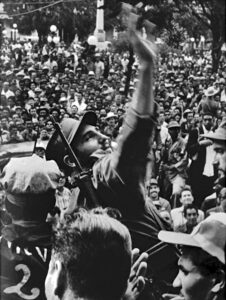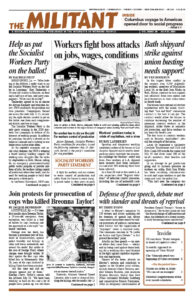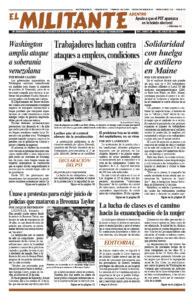
Che Guevara Speaks by Ernesto Che Guevara is one of Pathfinder’s Books of the Month for July. Che, born in Argentina, became a central leader of the Cuban Revolution and one of the outstanding communists of the 20th century. The excerpt is from “Socialism and Man in Cuba,” his famous presentation of the tasks and challenges of the working class in transforming itself in struggle to lead the transition to socialism. After its publication in 1965, Che left Cuba to advance new revolutionary battles abroad, leading Cuban and other fighters on internationalist missions in the Congo and then Bolivia. Che Guevara Speaks has been kept continuously in print since Che was wounded, captured by CIA-trained Bolivian army forces on Oct. 8, 1967, and then murdered the following day. Copyright © 2000 by Pathfinder Press. Reprinted by permission.
[T]he exact date of the beginning of the revolutionary struggle — which would culminate in January 1959 — was July 26, 1953. A group of men led by Fidel Castro attacked the Moncada garrison in Oriente province on the morning of that day. The attack was a failure; the failure became a disaster; and the survivors ended up in prison, beginning the revolutionary struggle again after they were freed by an amnesty.
In this process, in which there was only the germ of socialism, man was a fundamental factor. We put our trust in him — individual, specific, with a first and last name — and the triumph or failure of the mission entrusted to him depended on his capacity for action.
Then came the stage of guerrilla struggle. It developed in two distinct environments: the people, the still sleeping mass that had to be mobilized; and its vanguard, the guerrillas, the motor force of the mobilization, the generator of revolutionary consciousness and militant enthusiasm. This vanguard was the catalyzing agent that created the subjective conditions necessary for victory.
Here again, in the framework of the proletarianization of our thinking, of this revolution that took place in our habits and our minds, the individual was the basic factor. Every one of the fighters of the Sierra Maestra who reached an upper rank in the revolutionary forces has a record of outstanding deeds to his credit. They attained their rank on this basis. It was the first heroic period, and in it they competed for the heaviest responsibilities, for the greatest dangers, with no other satisfaction than fulfilling a duty.
In our work of revolutionary education we frequently return to this instructive theme. In the attitude of our fighters could be glimpsed the man of the future.
On other occasions in our history the act of total dedication to the revolutionary cause was repeated. During the October [1962 missile] crisis and in the days of Hurricane Flora we saw exceptional deeds of valor and sacrifice performed by an entire people. Finding the method to perpetuate this heroic attitude in daily life is, from the ideological standpoint, one of our fundamental tasks.
In January 1959 the revolutionary government was established with the participation of various members of the treacherous bourgeoisie. The presence of the Rebel Army as the basic element of strength constituted the guarantee of power.
Serious contradictions developed right away. In the first instance, in February 1959, these were resolved when Fidel Castro assumed leadership of the government, taking the post of prime minister. This process culminated in July of the same year with the resignation under mass pressure of President Urrutia.
In the history of the Cuban revolution there now appeared a character, well-defined in its features, who would systematically reappear: the mass.
This multifaceted being is not, as is claimed, the sum of elements of the same type (reduced, moreover, to that same type by the reigning system), which acts like a flock of sheep. It is true that it follows its leaders, basically Fidel Castro, without hesitation. But the degree to which he won this trust results precisely from having interpreted the people’s desires and aspirations in their full meaning, and from the sincere struggle to fulfill the promises he made.
The mass participated in the agrarian reform and in the difficult task of the administration of state enterprises; it went through the heroic experience of Playa Girón; it was hardened in the battles against various bands of bandits armed by the CIA; it lived through one of the most important decisions of modern times during the October crisis; and today it continues to work for the building of socialism.
Viewed superficially, it might appear that those who speak of the subordination of the individual to the state are right. The mass carries out with matchless enthusiasm and discipline the tasks set by the government, whether in the field of the economy, culture, defense, sports, etc.
The initiative generally comes from Fidel or from the revolutionary high command and is explained to the people, who make it their own. In some cases the party and government take a local experience and generalize it, following the same procedure.
Nevertheless, the state sometimes makes mistakes. When one of these mistakes occurs, one notes a decline in collective enthusiasm due to the effect of a quantitative decrease in each of the elements that make up the mass. Work is paralyzed until it is reduced to insignificant amounts. It is time to make a correction. …
In this Fidel is a master. His own special way of fusing himself with the people can be appreciated only by seeing him in action. At the great public mass meetings one can observe something like the dialogue of two tuning forks whose vibrations interact, producing new sounds. Fidel and the mass begin to vibrate together in a dialogue of growing intensity until they reach the climax in an abrupt conclusion crowned by our cry of struggle and victory.
The difficult thing to understand for someone not living through the experience of the revolution is this close dialectical unity between the individual and the mass in which both are interrelated and, at the same time, in which the mass, as an aggregate of individuals, interacts with its leaders.

